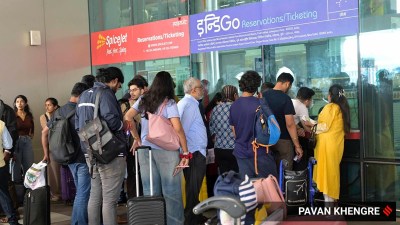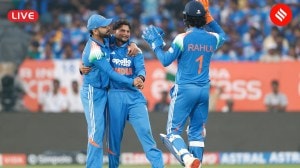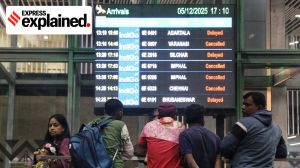‘If I don’t discharge my duties, who will?’
Pointing out that the Governor has been made the chairman of the Amarnath Shrine Board by the state, Lt Gen (Retd) S K Sinha says it is his job now to facilitate the yatra. The controversy was an unnecessary one, created by politicians, but it is over now. Excerpts from an interview with Muzamil Jaleel and Riyaz Wani

• Amarnath Yatra has become a political issue in J-K since you took over as the Governor. The former Chief Minister (Mufti Mohammad Sayeed) took severe exception to your style of functioning. Now his daughter, the PDP president, says the Shrine board is sidelining local workers and accused the board levying registration charges on the labourers.
PDP’s statement that Shri Amarnath Shrine Board charges Rs 2,400 from ponywallas and pithowallas is wrong. And to say that Governor is preoccupied with the yatra is not correct. The yatra takes place once a year for two months. I am active on so many other fronts also.
• Many argue that the problem starts with the exclusive association of the secular institution of the Governor with a religious body.
Normally, the Governor should not have been associated. But in 2001, state legislature passed Amarnath Shrine Board Act, which made the Governor the chairman of the Board. So, if I don’t deliver my duties, who will? My job is to try and improve the situation and facilitate the yatra. Besides, I as a Governor, am also trying to promote Kashmiriyat through the pilgrimmage. SASB is organizing Sufi music festivals. We did it last year, we are doing it in a bigger way this year.
• The stand-off with government had created a near constitutional crisis.
2003 and 2004 were years of controversy. We were not even allowed to put up pre-fab structures in yatra areas. It was only after the Centre’s intervention and the resignation (threat) of the four ministers that the yatra could be held. I sent two letters to Chief Minister (Mufti Sayeed) in November 2003 and February 2004, urging him to let the yatra go on normally. The letters were not even acknowledged. I think it was an unnecessary controversy. But who created it (the controversy)? Not the Government of India, not Governor, but the elected representatives of people from the state. But now, there are no differences between me and the state government. In fact, it was Azad Sahib, who in 2004 helped resolve the controversy. There is advantage when we provide better infrastructure. If we give better facilities—we will get people with better paying capacities. This will improve the economy.
• Recently, the report of state Pollution Control Board has expressed concern over the yatra’s impact on the fragile environment of Pahalgam and Sonamarg. They want the duration of the yatra and the number of pilgrims to be limited.
I read about the PCB report in the newspapers. We were never consulted on the issue. However, the Shrine board is taking adequate measures. The biggest cause of pollution is the human excreta. And the open deep trench latrines which the J-K Government had built are unhygienic. In 2004, it was one of the first things I wanted to eliminate. I decided to set up pre-fab structures. The problem was that the land did not belong to SASB. The state government also did not allow us to build them. But this year, we have been given a free hand. We have built 1,500 toilets every two kilometres on the treks. We are also applying the Japanese technique of mixing bacteria with excreta, which helps turn it to urea. Besides, when yatra ends, we launch a cleaning drive.
• Over the past three years, Kashmir is in the thick of the dialogue process. What is your perspective on a solution?
My personal view on Kashmir solution has two aspects: conflict management, and conflict resolution. The first focuses on the reduction of violence. When I came in 2002, there was a feeling of terror. But over the past three years, there has been a gradual improvement. The reason was that the security forces had more success in the counter-insurgency operations. In 2003, the security forces on an average killed 10 people every day. In 2004, the number came down to seven and in 2005, four. As for the solution, I think a stage has come when economics should get importance over politics. Like European Union, economy can bind us. National frontiers lose their edges and sharpness. President Musharraf himself has said that LoC should be made irrelevant and that there should be a free movement of the people. In a settled Kashmir, there should be democracy in Muzafferabad and Northern Areas. The Line of Control should be made Line of Peace and Commerce. We can also shape SAARC on the lines of a vibrant European Union.
• Some political parties like PDP have been floating the idea of handing over the counter-insurgency operations to J-K Police as essential to the normalisation process.
Putting J-K Police in charge would be an ideal arrangement, but before that violence has to end. I don’t think counter-insurgency operations are bad for the Army, especially when we have a proxy war. I have myself been a professional. The British used North Western Frontier Province as a training ground for its army. Fighting tribals created conditions like war. After Independence, Indian Army also was sucked into counter-insurgency operations. Besides, I think in an atmosphere of proxy war, when two nuclear powered neighbours are involved, police is not the best force to fight the insurgency.
• In the past two months, Kashmir has been roiled by the sex abuse scandal. How do you view it?
I would like prompt, salutary action against the guilty. And I would like measures instituted so that this type of activity does not recur. But it can happen in any state or anywhere in the world. So far as the investigation is concerned, I think it is going in the right direction. The case is in High Court. CBI is investigating it. Chief Minister and I hold the same view on the issue. We both want that the case should be dealt with in a transparent manner.
- 01
- 02
- 03
- 04
- 05































